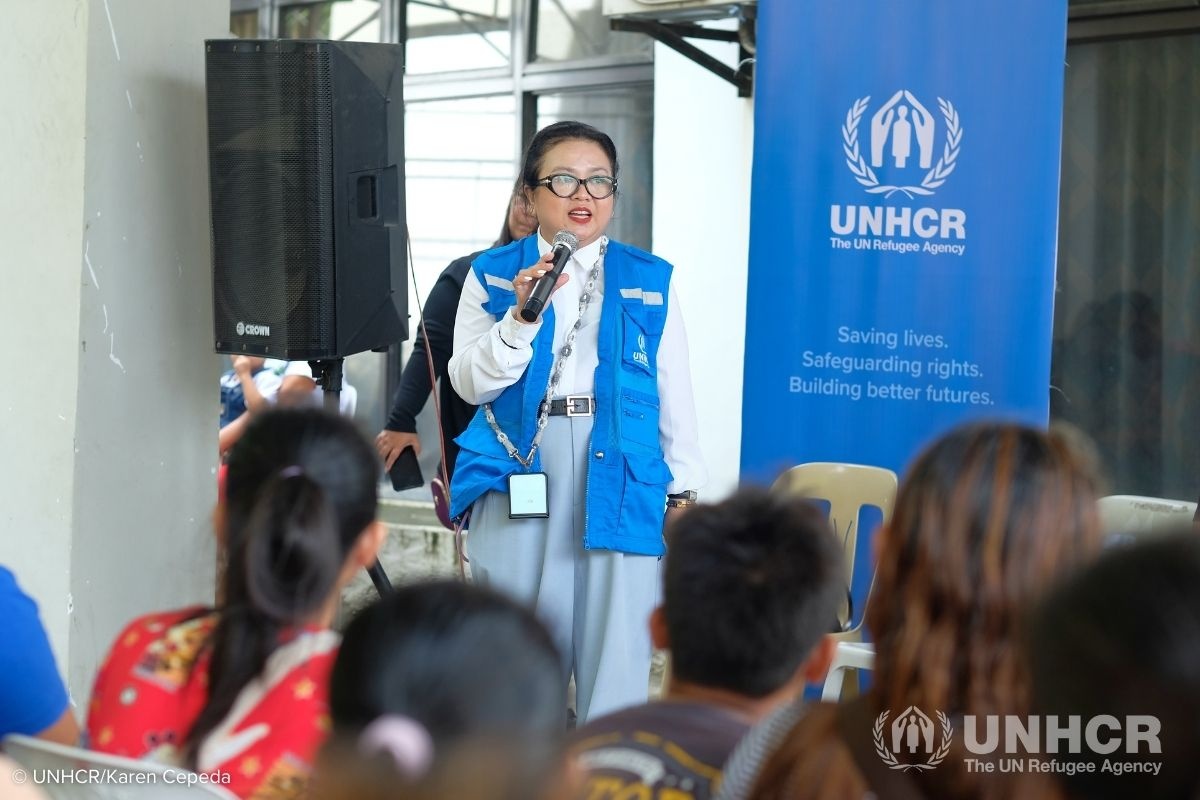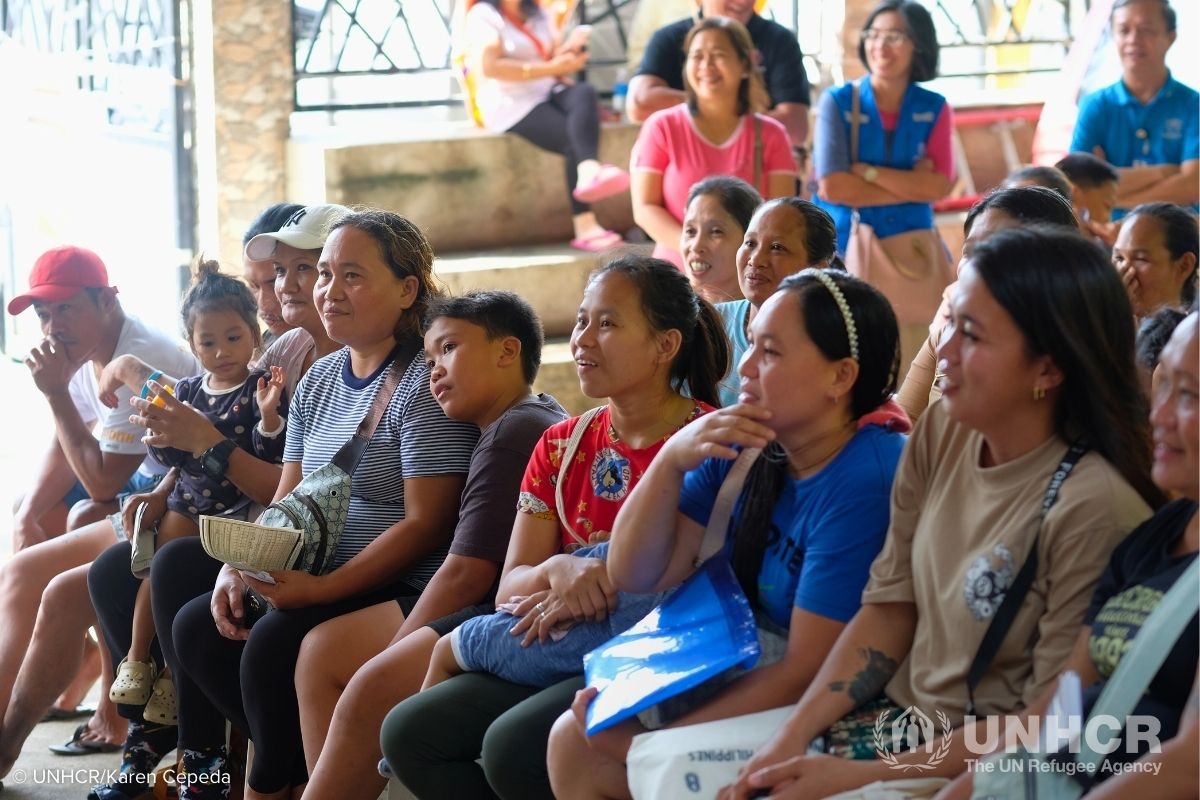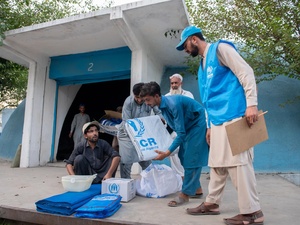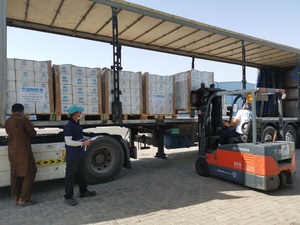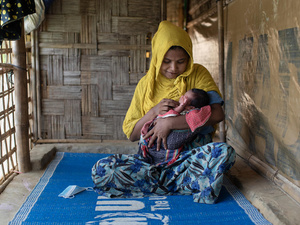Unable to return and facing cyclical displacement, a mother continues to dream of home
Unable to return and facing cyclical displacement, a mother continues to dream of home

Sainaliah sits with her daughter while waiting for her turn to process her request for her children’s birth certificates. In the aftermath of Severe Tropical Storm Kristine, UNHCR Philippines provided cash for protection to internally displaced individuals and families in Talisay town, Batangas.
In the wake of Severe Tropical Storm Kristine (international name: Trami) and a series of subsequent cyclones in 2024, UNHCR Philippines quickly mobilized its team to deliver emergency assistance to communities ravaged by flooding and landslides in Batangas and Camarines Sur provinces. It was during their visit to Talisay town in Batangas, to provide cash for protection, that UNHCR met Sainaliah, a resilient mother of five who has endured years of displacement.
Sainaliah’s journey, marked by tragedy and perseverance, began in 2017 when the conflict in Marawi City forced her family to flee their home. They sought refuge in multiple places, from Iligan to Pagadian, and eventually to Calanogas, where Sainaliah's parents lived. “We were at home when the fighting in Marawi reached our community. At first, we didn’t believe it. But when the violence got closer, we had to leave. We had nowhere else to go. Thanks to the kindness of our neighbors, we were able to escape to Iligan and later to Pagadian and Calanogas. But it was never easy, especially with farming as our only source of livelihood in Calanogas," she recalls.
Sainaliah’s search for peace and stability didn’t end with the displacement from Marawi. Over the years, her family moved to several provinces in Luzon, including Quezon and Batangas, in pursuit of a safer and more peaceful life. “We faced countless hardships during the Marawi siege, staying in one evacuation center after another. But eventually, we managed to set up a small business selling baked goods and slippers here in Batangas,” she shares. “We have been living here for six years now. But then, the Taal volcano eruption in 2020 left us without a home again, and now, Severe Tropical Storm Kristine has swept away our home and livelihood. Despite it all, I told my husband not to cry because at least none of us were hurt.”

A staff from the Lipa Archdiocesan Social Action Commission, Inc. (LASAC) assists Sainaliah in filing her request for her children’s birth certificates.
With the support of UNHCR Philippines and its partner Caritas Philippines, Sainaliah and over 500 other forcibly displaced individuals were provided with cash for protection in Batangas. This assistance enabled her to replace the damaged birth certificates for her five children, which she hopes will help them resume their studies.
Beyond the assistance, Sainaliah’s story reflects the ongoing struggles faced by displaced families across the Philippines. Her family’s journey—from Marawi to Batangas—represents a larger crisis: the intersection of conflict, natural hazards, and the devastating impacts of extreme weather disturbances.
“The urgency of addressing the needs of displaced communities is something UNHCR Philippines is deeply committed to,” said Maria Ermina Valdeavilla-Gallardo, Head of National Office for UNHCR Philippines. “We are working with national and local government agencies to push for a legal framework that ensures the protection of internally displaced persons (IDPs) at every phase of their displacement. This includes access to emergency aid, psychological support, healthcare, essential services, and civil documentation, and opportunities for rebuilding lives and securing livelihoods."
With the enactment of the Bangsamoro Autonomy Act No. 62, also known as the Rights of Internally Displaced Persons of the Bangsamoro Autonomous Region Act of 2024, UNHCR remains hopeful for similar legislation at the national level. “A law prioritizing the rights and welfare of IDPs would be of great help to families like us,” Sainaliah says.
During the aftermath of Severe Tropical Storm Kristine, Sainaliah’s family had to move from one evacuation center to another. They had to leave the school they were initially staying in as it had o be reopened to students at the resumption of classes. When UNHCR met Sainaliah, she said that her husband was actively searching for a house to rent in town, hoping to find a place where they can again resume rebuilding their lives.
Through every trial, Sainaliah's resilience has been unwavering. From the horrors of the Marawi siege to the uncertainty of the Taal volcano eruption, and now, the devastation of floods and landslides. Her determination to protect her children and husband and remain hopeful for the future shines through.
“We have been asked if we are planning to return to Marawi, but I told them we no longer have a place to call home. Sampaloc is peaceful, and I feel safe here with my children, even when my husband has to leave us for work,” she reflects. “We remain vigilant and prepared for any outcome, and we place our trust in God in case we need to leave our home again. We just need to stay strong.”
While Sainaliah’s story is a testament to the strength and resilience of displaced communities, the challenge remains to raise awareness and gather support for a sustainable, long-term, and whole-of-society approach to addressing the challenges faced by millions of IDPs in the Philippines.
***
ABOUT UNHCR
The United Nations High Commissioner for Refugees (UNHCR), the UN Refugee Agency, is a global organization dedicated to saving lives, protecting rights and building a better future for people forced to flee their homes because of conflict and persecution. We lead international action to protect refugees, forcibly displaced communities and stateless people. We deliver life-saving assistance, help safeguard fundamental human rights, and develop solutions that ensure people have a safe place called home where they can build a better future. We also work to ensure that stateless people are granted a nationality. We work in over 130 countries, using our expertise to protect and care for millions.
In the Philippines, UNHCR has maintained its presence since 1975, working on providing durable solutions to refugees, ending and reducing statelessness, and empowering displaced families.
For more information, please contact:
Karen Cepeda
External Relations Associate
[email protected]
(02) 88172398
Facebook | Twitter | Instagram


